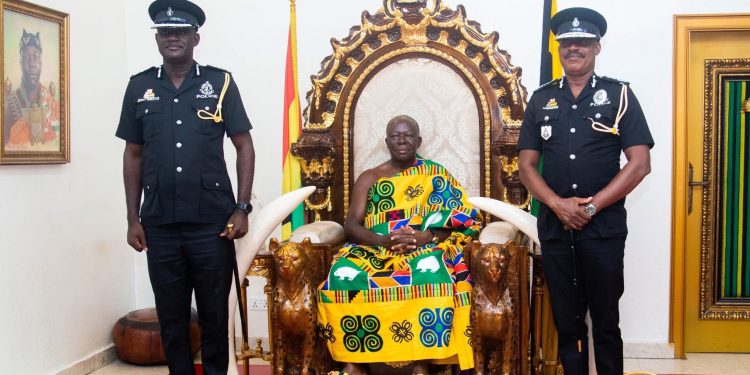The Otumfuo Osei Tutu II, widely known as the Asantehene, has issued a sweeping directive that all land and chieftaincy disputes within the Asanteman traditional area must be referred to him for resolution. The order follows the submission of a report by the DCOP Emmanuel Teye Cudjoe, the Ashanti Regional Police Commander, which highlighted a sharp rise in conflicts among chiefs over stool lands and traditional authority.
In the meeting of the Asanteman Council held at Manhyia Palace on 16 October 2025, the Asantehene condemned the escalation of land disputes, particularly among his sub-chiefs, and emphasised that no matter how small or localized a conflict may be, it must be submitted to his palace rather than handled independently. “If you think another chief has taken part of your land, bring the issue before me and I will look into it. You don’t have to take the law into your hands and engage in violence,” he stated.
The police report, which has been widely circulated in traditional and security circles, reportedly details specific chiefs implicated in land-related disagreements and highlights how these disputes are increasingly turning violent or being fuelled by land-guards and other informal enforcers. The Asantehene made clear that those identified would be summoned privately for discussions, signalling an intensified oversight over stool lands and customary governance within Asanteman.

Beyond land matters, the Asantehene extended his directive to chieftaincy disputes, reminding traditional authorities that the integrity of their offices depends on adherence to customary modalities and peaceful contestation. He told the police to arrest parties involved in chieftaincy disputes when brought to their attention and to inform his office immediately so he can assume responsibility for mediation. “When anyone comes to you with such, arrest all the parties and come and inform me,” he told the police commander.
The significance of the directive lies in the positioning of the Asantehene’s traditional role as ultimate arbiter of both land and stool disputes, a role firmly rooted in Ashanti customary law where stool lands are vested in the king, and sub-chiefs act as caretakers. Locals sympathetic to the King’s move believe it will reduce violent incidents, restore trust in traditional institutions, and ensure that chiefs who misuse their authority face consequences, including possible destoolment.
Observers note several layers of impact: first, by redirecting dispute resolution to the palace, the traditional authority aims to reclaim control over land governance, thereby deterring land-guard practices and multiple sales of the same parcel of stool land. Second, the directive signals a crackdown on chiefs engaging in irregular allocations or failure to respect the hierarchy of authority and established customary protocol. And third, it positions the Asantehene’s palace as a mediation hub, potentially reducing pressure on formal courts and the police, which are often overburdened with land-criminality cases.

Critics, however, have raised questions around enforceability and transparency. Traditional land and chieftaincy disputes in Ghana are frequently contested in the formal judicial system, and some parties may resist submission to customary authority if they believe they will not receive impartial hearings. Others caution that the directive, while authoritative, will require robust institutional support, such as records of transactions, documentation, and collaboration between traditional councils and state agencies, to truly alter the dynamic of land conflict in the region.
Nevertheless, the Asantehene’s remarks underscore the urgency with which the Ashanti Kingdom is treating land-guardism, inter-chief disputes and stool-land irregularities. “Don’t push me to summon you publicly. Put everything on hold until I review the disputes,” he warned, making clear that premature actions that circumvent customary channels are unacceptable.
For the regional police, the new directive signals closer collaboration with traditional authority and clearer escalation protocols: all disputes first reported to the palace before further legal or criminal proceedings unfold. The police commissioner publicly affirmed the partnership, acknowledging that many land-related cases now emanate from feelings of injustice and customary breakdowns rather than purely criminal motives.
As implementation begins, parties engaged in current land or chieftaincy disputes in Ashanti Region are expected to pause actions, comply with the directive, and await palace-level mediation. Whether this top-down direction can stem the long-standing cycle of conflict over stool lands and chief-tenant relations remains to be seen, but the mandate is clear: unity, peace and justice must begin in Asanteman first.
Tension Rises: COP Kofi Boakye Challenges IGP Dampare’s Continuation As IGP

